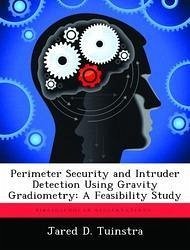
Perimeter Security and Intruder Detection Using Gravity Gradiometry: A Feasibility Study
Versandkostenfrei!
Versandfertig in über 4 Wochen
53,99 €
inkl. MwSt.

PAYBACK Punkte
27 °P sammeln!
Changes in the mass distribution around some point on the Earth's surface induce corresponding changes to the magnitude and direction of the gravity vector at that location. The nine-tensor derivative of the gravity vector, or gravity gradient, is sensitive to very small changes in the gravity vector. With some assumptions, continuous measurement of the gravity gradient using a gravity gradiometer (GGI) can be used to determine the location of a mass change in the local area near the instrument. This investigation sought to determine the effectiveness, operating characteristics, and limitation...
Changes in the mass distribution around some point on the Earth's surface induce corresponding changes to the magnitude and direction of the gravity vector at that location. The nine-tensor derivative of the gravity vector, or gravity gradient, is sensitive to very small changes in the gravity vector. With some assumptions, continuous measurement of the gravity gradient using a gravity gradiometer (GGI) can be used to determine the location of a mass change in the local area near the instrument. This investigation sought to determine the effectiveness, operating characteristics, and limitations of a physical perimeter security system that uses an array of GGIs to detect and locate a human intruder. Results were obtained via computer simulations that utilized the closed form solution for calculating a gravity gradient given an object's size and mass, as well as industry-predicted future GGI performance characteristics.














